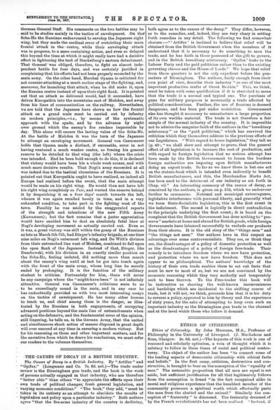THE CAUSES OF DECAY IN A BRITISH INDUSTRY.
' The Causes of Decay in a British Industry. By " Artifex" and
• "Opifex." '(Longmans and Co. 7s. 6d. net.)—The trade under review is the Birmingham gun trade,end the book is the work of persons actually engaged in that industry, who are therefore "better able" than others.'" to appreciate the effects upon their
• own trade of political changes; fresh general 'legislation, and varVing economic conditions." "The book," they add;" must be taken in its entirety as an attempt to elucidate the results of ' legislation and policy upon a particular industry." Both authors agree "that the fire-arms industry of the country is deolining,
both agree as to the causes of the decay." They differ, however, as to the remedies, and, indeed, they are very chary in setting forth remedies in any detail. The following we find somewhat■ obscure,—" Artifex ' is inclined to believe that relief will be obtained from the British Government when the members of it understand that it is necessary to do something to save the trade, and he has faith in those possessed of the gift to govern, and in the British hereditary aristocracy. Opifex ' looks to the Labour Party and the paid politician rather than to the existing governing classes and the House of Lards." We hope that relief from these quarters is not the only expedient before the gun. makers of Birmingham. The authors, fairly enough from their own point of view, describe their industry "as one of the most important productive crafts of Great Britain." This, we think, must be taken with some qualification if it is stretched to mean that the trade is a normal and typical ono. The purchase of guns for military purposes is necessarily a trade affected by political considerations. Further, the use of firearms is deemed dangerous, and has been put under restrictioo. Government also has thought it necessary to manufacture a large proportion of its own warlike material. The trade is not therefore a fair ample of the normal industry of the country. It is impossible not to admire the sanguine faith of the authors in the "hereditary aristocracy" or the "paid politician," which has survived the criticism which they themselves address to the previous efforts of our Legislature. "With regard to home legislation," they tell us (p. SaN "we shall show and attempt to prove, that the general effect of all legislation is to increase the cost of production, and with regard to foreign legislation that no serious attempt has been made by the British Government to lessen the burdens foreign authorities are imposing upon British manufacturers doing an export trade. So far as we know there is but one act on the statute-book which is intended even indirectly to benefit British manufacturers, and this, the Merchandise Marks Act, has been used to the detriment of our industry as set forth in Chap. vii." An interesting summary of the causes of decay, as conceived by the authors, is given on p. 251, which we endeavour further to summarise. National and municipal extravagance, legislative interference with personal liberty, and generally what we term State-Socialistic legislation, this is the that count in the indictment. The second is logically in direct contradiction to the principle underlying the first count; it is based on the complaint that the British Government has done nothing to" pre- serve "markets at home and abroad for British goods, while foreign Governments have laboured successfully to exclude our products from their shores. It is the old story of the "things seen" and "the things not seen." Our authors have in this respect an advantage over some controversialists. They see, or think they see, the disadvantages of a policy of domestic protection as well as the disadvantages of a policy of foreign free-trade. Their remedy is to introduce freedom where we now have protection, and protection where we now have freedom. This dew not appear to us philosophical. The authors' knowledge of the history of their own trade enables them to set out facts that must be new to most of us, but we are not convinced by the economic reasoning which they very modestly and temperately seek to base thereon. To the Free-trader this book will be instructive as showing the well-known inconveniences and hardships which are incidental to the shifting course of trade, but it will not, we think, persuade him that it is his duty to reverse a policy, approved to him by theory and the experience of sixty years, for the sake of attempting to keep even such an important industry as the Birmingham gun trade in the channel and at the level which those who follow it demand.
















































 Previous page
Previous page